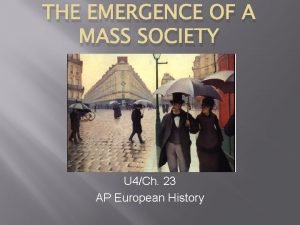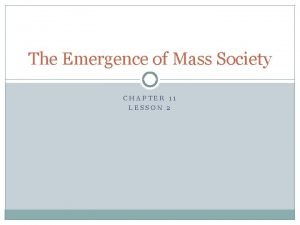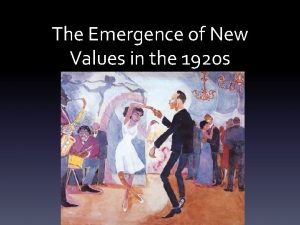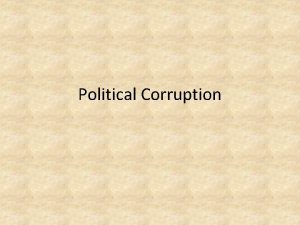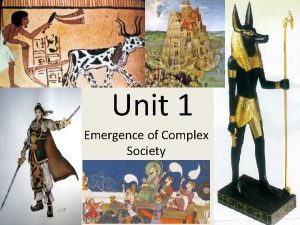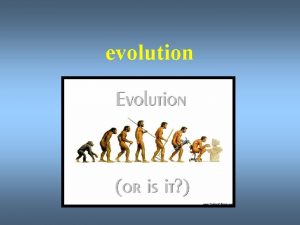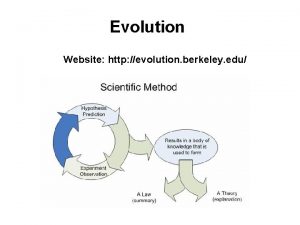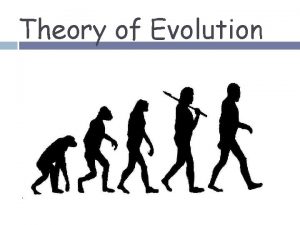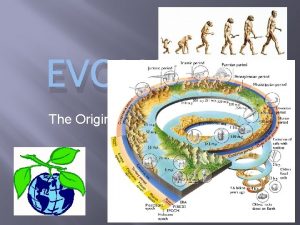The political evolution I The emergence of political































- Slides: 31

The political evolution

I. The emergence of political parties (1789 -1824) II. Jacksonian America III. Sectional politics IV. Reconstruction V. Gilded Age politics

FEDERALISTS George Washington (1789 -1797) John Adams, 1797 -1801) ANTI-FEDERALISTS Thomas Jefferson (1801 -1809) James Madison (1809 -1817) James Monroe (1817 -1825),

George Washington (1789 -1796) Creation of the judiciary system by Congress Supervise the settlement of territories previously held by Britain and Spain Stabilize the north-western frontier, and Oversee the admission of three new states: Vermont (1791), Kentucky (1792), and Tennessee (1796). In his Farewell Address of 1796, he warned the nation to "steer clear of permanent alliances with any portion of the foreign world. " = avoid entangling alliances and not get involved in their constant wars.

The First Political Party system FEDERALISTS REPUBLICANS/DEMOCRATICREPUBLICANS or JEFFERSONIAN REPUBLICANS Alexander Hamilton Thomas Jefferson Conservatives Northern urban mercantile interests Agricultural interests/South Support of a strong government, strong military Little need of a strong central goverment, weak military Good relations with England Good relations with France Ex: creation of the Bank of the US

Jay’s Treaty, 1795 Secure the withdrawal of British soldiers from western forts but allow the British to continue the fur trade with the Indians in the Northwest. London agreed to pay damages for American ships and cargoes seized in 1793 and 1794, but made no commitments on possible future seizures. London granted some rights to trade with British possessions in India and the Caribbean, in exchange for American limits on the export of cotton. Yet, failed to put an end to British "impressment" (forced recruitment) of American sailors into the Royal Navy Supported by the Federalists

Quasi-War with France, 1798 -1800 Violation of the 1778 Treaty of Alliance The French began to seize American ships trading with their British enemies and broke up diplomatic relations. "XYZ Affair, " = French agents demanded a bribe ($12 million) for the restoration of diplomatic relations with the United States. Alien and Sedition Acts, 1798: The Alien Act = alien resident considered "dangerous to the peace and safety of the United States to be deported The Sedition Act = a crime to publish "false, scandalous, and malicious writing" against the government or its officials. The Naturalization Act = the duration of residence required for aliens to become citizens, extended from 5 to 14 years. The Alien Enemies Act = deport resident aliens if their home countries were at war with the United States

Thomas Jefferson, 1801 -1809 Promised "a wise and frugal government" that would preserve order among the inhabitants but leave people "otherwise free to regulate their own pursuits of industry, and improvement. " Main author of the Declaration of Independence Washington’s First Secretary of State + Adams’ Vice President in 1797 Signed the Act Prohibiting Importation of Slaves was signed into law by Jefferson on March 2, 1807 (owned around 175 slaves) Commissioned the Lewis and Clark Expedition after the Louisiana Purchase

The 1814 Hartford Convention = the limits of the Constitution Prohibiting any trade embargo lasting over 60 days; Requiring a two-thirds Congressional authority for any declaration of war, admission of a new state, or interdiction of foreign commerce; Removing the three-fifths representation advantage of the slaveholding South; Limiting future Presidents to one term; Requiring each future President to be from a different state than his predecessor.

The second political party system (1828 -1854) The National Republican Party (1829 The Democratic Party -1833) The Whigs (1833 -1856) John Quincy Adams (1825 -1829) John Tyler (1841 -1845) Zachary Taylor Millard Fillmore (1850 -1853) Andrew Jackson (1829 -1837) Martin Van Buren (1837 -1841) James Polk (1845 -1849) Opposition to Jackson’s monarchical rule (King Andrew I) = Jefferson’s Democratic Republicans = the Federalists Planters, farmers, reformers, new immigrants (Catholics) Interests of the Northern urban elite, The South and West merchants, the new industrial bourgeoisie, evangelical Protestants and English and Scots-Irish immigrants Strong federal government, supremacy Small decentralized government of Congress Expansion of the nation Expansion of slavery in the new territories

Andrew Jackson and popular democracy (18291837) Drew his support from the "common people”= victory of the West (Tennessee) New enthusiasm for popular democracy/Changes in the 1828 election: universal white male suffrage, written ballots replaced oral voting, new campaign styles (tours, the press) Strong personality, use of presidential veto The Spoils System/Patronage Was confronted to South Carolina in the Nullification Crisis

SECTIONAL POLITICS • The NORTHERN DEMOCRATS • The SOUTHERN DEMOCRATS • THE FREE-SOILERS • THE KNOW-NOTHINGS • THE REPUBLICANS

President Lincoln’s Plan « 10% Plan > Quick readmission : Keep property (except slaves) + Didn’t want to punish citizens for rebellions * Proclamation of Amnesty and Reconstruction (December 8, 1863) * Declared Confederation void * * Pardoned all ex-Confederates except the military leaders if, in any state, 10 percent of the population was ready to vote for a government that would be loyal to the U. S. Constitution Congress rejected it: severe punishment for all the seceded states

Lincoln’s Assassination April 14 th, 1865 At Ford’s Theater is Washington, DC Play: “Our American Cousin” At approximately 10: 20 PM, Lincoln was shot near his left ear John Wilkes Booth = a Virginia actor embittered by the South's defeat. Knew the play (shot during a part when the crowd would be laughing) Was captured and killed on April 26, 1865



President Andrew Johnson « Jacksonian Democrat. « Why? « Lincoln feared he would lose the 1864 election « Reconstruction would be easier if they could claim some support from the South.

President Johnson’s Plan (10%+) « Offered amnesty upon simple oath to all except Confederate civil and military officers « In new constitutions, they must accept minimum conditions repudiating slavery, secession and state debts. « Named provisional governors in each ex. Confederate states and called them to oversee elections for constitutional conventions. . « granted 13, 500 special pardons (planter aristocrats) = outraged Republicans « Tensions between the president and Congress

1866, Congress was animated by Radical Republicans Will to democratize the South, Establish public education, Ensure the rights of freedmen, Black suffrage, Confiscation of the land of the great planters Redistribution of that land.

President Johnson’s Impeachment « Johnson removed Edwin Stanton in February, 1868. « The House impeached him on February 24 by a vote of 126 – 47! « Johnson was acquitted 35 to 19 by the Senate (one short of required 2/3 s vote).


1868 Presidential Election

1872 Presidential Election

A new Southern Republican Party rose in 1868 -70 The carpetbaggers = Northerners who had gone South after the war to make their political fortunes, and introduce northern ways such as industry, public education, often working in alliance with newly freed African Americans >>> considered as exploiters, opportunists

The contested 1876 Presidential Election

Compromise of 1877 Settled the dispute regarding the Election of 1876 The removal of all U. S. military forces from the former Confederate states. The appointment of at least one Southern Democrat to Hayes' cabinet. Legislation to help industrialize the South and restore its economy following Reconstruction and the Civil War. The right to deal with blacks without northern interference. >>> END OF RECONSTRUCTION

The Democrats are back! - Use of paramilitary groups (the White League, the Red Shirts) to disrupt Republican organizing, to run Republican officeholders out of town, and intimidate blacks to suppress their voting. - Extensive voter fraud The Solid South = the electoral support of the South for the Democratic Party from 1877 to 1964

POLITICS IN THE GILDED AGE As cities grew in the late 19 th century, so did political machines Political machines controlled the activities of a political party in a city The head of the Political machine was known as the “Boss”

ROLE OF THE POLITICAL BOSS The “Boss” controlled jobs, business licenses, granting of contracts and influenced laws and courts Political Machines helped immigrants with naturalization (citizenship), jobs, and housing in exchange for votes Boss Tweed ran NYC

THE TWEED RING SCANDAL William M. Tweed, known as Boss Tweed, became head of Tammany Hall, NYC’s powerful Democratic political machines Between 1869 -1871, Tweed led the Tweed Ring, a group of corrupt politicians, in defrauding the city Tweed’s ring stole between 40 and 200 million Tweed died in Jail Boss Tweed

Political Corruption was considered to be widespread President Grant’s Administration Voter Fraud- used fake names and voted multiple times Patronage- granting favors in return for political support Graft- bribes kick-backs - Return of money in exchange for a business
 Systemic game design
Systemic game design Landmarks in emergence of corporate governance
Landmarks in emergence of corporate governance Plan emergence madagascar 2019-2023 pdf
Plan emergence madagascar 2019-2023 pdf Plan emergence madagascar 2019-2023 pdf
Plan emergence madagascar 2019-2023 pdf Stages of language development
Stages of language development The emergence of mass society
The emergence of mass society Netflix core competencies
Netflix core competencies Emergence theory
Emergence theory Emergence profile
Emergence profile Emergence of scaling in random networks
Emergence of scaling in random networks Entrepreneurship during post independence
Entrepreneurship during post independence Lesson 2 the emergence of mass society
Lesson 2 the emergence of mass society Strong and weak emergence
Strong and weak emergence Speech emergence
Speech emergence The emergence of new values
The emergence of new values Positional/definitional boundary disputes
Positional/definitional boundary disputes Tư thế worm breton là gì
Tư thế worm breton là gì ưu thế lai là gì
ưu thế lai là gì Tư thế ngồi viết
Tư thế ngồi viết Thẻ vin
Thẻ vin Cái miệng nó xinh thế
Cái miệng nó xinh thế Các châu lục và đại dương trên thế giới
Các châu lục và đại dương trên thế giới Bổ thể
Bổ thể Từ ngữ thể hiện lòng nhân hậu
Từ ngữ thể hiện lòng nhân hậu Tư thế ngồi viết
Tư thế ngồi viết Thế nào là giọng cùng tên? *
Thế nào là giọng cùng tên? * Thơ thất ngôn tứ tuyệt đường luật
Thơ thất ngôn tứ tuyệt đường luật Làm thế nào để 102-1=99
Làm thế nào để 102-1=99 Hát lên người ơi
Hát lên người ơi Khi nào hổ mẹ dạy hổ con săn mồi
Khi nào hổ mẹ dạy hổ con săn mồi Diễn thế sinh thái là
Diễn thế sinh thái là đại từ thay thế
đại từ thay thế





